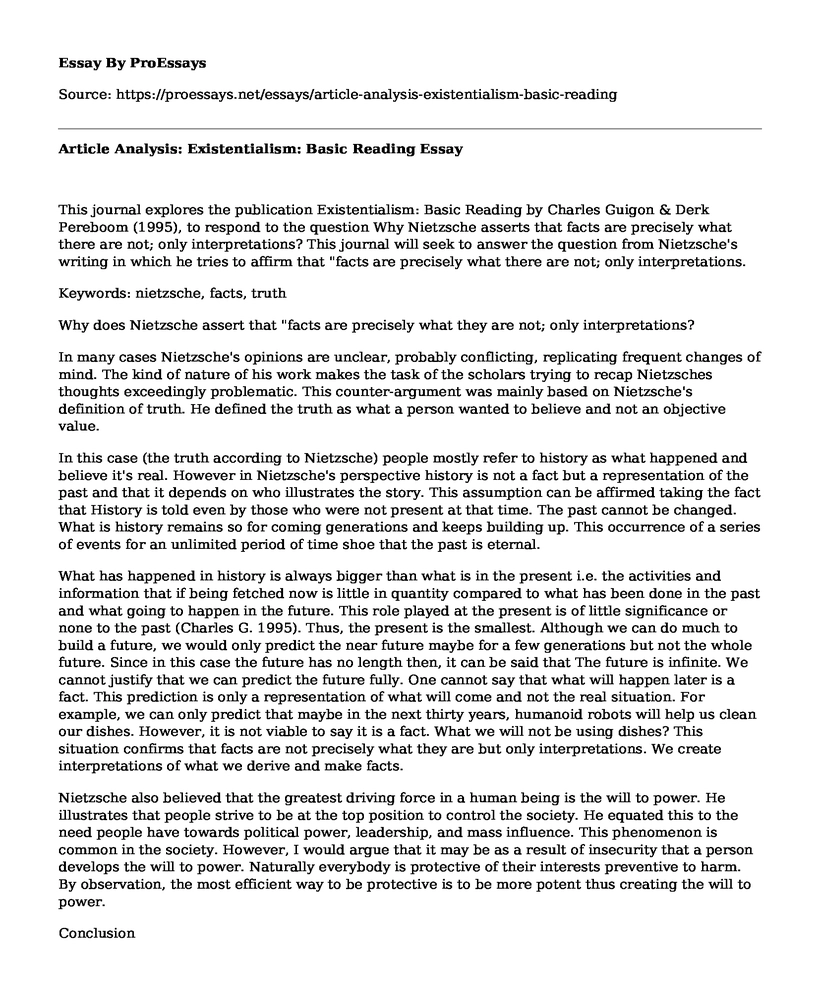This journal explores the publication Existentialism: Basic Reading by Charles Guigon & Derk Pereboom (1995), to respond to the question Why Nietzsche asserts that facts are precisely what there are not; only interpretations? This journal will seek to answer the question from Nietzsche's writing in which he tries to affirm that "facts are precisely what there are not; only interpretations.
Keywords: nietzsche, facts, truth
Why does Nietzsche assert that "facts are precisely what they are not; only interpretations?
In many cases Nietzsche's opinions are unclear, probably conflicting, replicating frequent changes of mind. The kind of nature of his work makes the task of the scholars trying to recap Nietzsches thoughts exceedingly problematic. This counter-argument was mainly based on Nietzsche's definition of truth. He defined the truth as what a person wanted to believe and not an objective value.
In this case (the truth according to Nietzsche) people mostly refer to history as what happened and believe it's real. However in Nietzsche's perspective history is not a fact but a representation of the past and that it depends on who illustrates the story. This assumption can be affirmed taking the fact that History is told even by those who were not present at that time. The past cannot be changed. What is history remains so for coming generations and keeps building up. This occurrence of a series of events for an unlimited period of time shoe that the past is eternal.
What has happened in history is always bigger than what is in the present i.e. the activities and information that if being fetched now is little in quantity compared to what has been done in the past and what going to happen in the future. This role played at the present is of little significance or none to the past (Charles G. 1995). Thus, the present is the smallest. Although we can do much to build a future, we would only predict the near future maybe for a few generations but not the whole future. Since in this case the future has no length then, it can be said that The future is infinite. We cannot justify that we can predict the future fully. One cannot say that what will happen later is a fact. This prediction is only a representation of what will come and not the real situation. For example, we can only predict that maybe in the next thirty years, humanoid robots will help us clean our dishes. However, it is not viable to say it is a fact. What we will not be using dishes? This situation confirms that facts are not precisely what they are but only interpretations. We create interpretations of what we derive and make facts.
Nietzsche also believed that the greatest driving force in a human being is the will to power. He illustrates that people strive to be at the top position to control the society. He equated this to the need people have towards political power, leadership, and mass influence. This phenomenon is common in the society. However, I would argue that it may be as a result of insecurity that a person develops the will to power. Naturally everybody is protective of their interests preventive to harm. By observation, the most efficient way to be protective is to be more potent thus creating the will to power.
Conclusion
This topic though contradicts since one cannot define the truth by what they believe. The problem is, if that statement is true, at that time it is considered a fact by itself, so Nietzsche has in effect opposed his statement by generating a counter-argument to his argument. It is a suggestion of the so-called liar paradox, known since primeval times. For example, if I say the statement I am saying at this moment is false then, if it happens to be true it still false, and if the statement is false then it's true. Somehow, it seems Nietzsche would not have cared. It is suggestive say that the particulars of logical breakdown barely had any attention or appeal for him at all, which makes him a rather strange philosopher.
Reference
Charles Guigon & Derk Pereboom (1995). Existentialism: Basic Reading Indianapolis, IN: Hackett.
Cite this page
Article Analysis: Existentialism: Basic Reading. (2021, Mar 15). Retrieved from https://proessays.net/essays/article-analysis-existentialism-basic-reading
If you are the original author of this essay and no longer wish to have it published on the ProEssays website, please click below to request its removal:
- Is There a Moral Obligation to Obey the Law? Article Review Example
- Evaluation Essay on Old Spice
- Plato and Aristotle on the Nature of Knowledge Essay
- Essay Sample on Morality vs Religion: Exploring the Difference
- Identity Development and Discrimination: Essay Sample
- Quantitative & Qualitative Research: Working Together for Maximum Results - Essay Sample
- Basic Characteristics of Qualitative Research - Essay Sample







